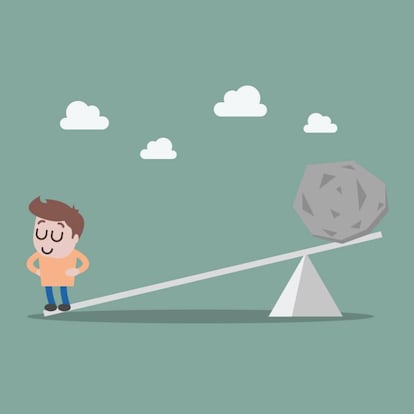The counterweight strategy: how to turn a weakness into an asset
The solution is not to work really hard at it, but to do something different that will help you reach your goal

We all have a weakness, or an area of improvement, to use a more politically correct term. It could be anything, from a bad memory to dyslexia, a dislike for math, or taking exams. Whatever it is, when we are faced with it, we may end up obsessing and wringing our hands. But there is another option: turning our weakness into an advantage by doing things differently.
Malcolm Gladwell explains it with examples drawn from history in his book David and Goliath: Underdogs, Misfits, And The Art Of Battling Giants. At first, nobody thought Vietnam could win the war against the US. It was an infinitely poorer country with far fewer weapons and resources. But Vietnam held tight. It became hell on Earth for the Americans, and made them want to get out within a few years. What was the secret? Vietnam defended itself using a different strategy. Because the country was small and its people knew the terrain better than any map, they created inaccessible tunnels and dissimulated their positions with a myriad of stratagems. They could not compete with the enemy’s weapons, so they came up with rudimentary, but very efficient, tools. This enabled them to catch the US Army by surprise time and again.
Any apparent weakness can be the starting point to awaken your creativity
It was just like when David confronted Goliath, in the Bible’s telling of the story. It did not occur to David to seek a hand-to-hand confrontation, since he was practically a child facing a giant. Instead, he hurled a stone at him with a sling, from a safe distance, and knocked the giant out. We can take all of the above it and apply it to our own weaknesses (minus the long distances and the fighting).
When we’re bad at something, we tend to make big efforts to overcome this deficiency. But the solution does not lie there; instead, it’s about doing something different, about finding a counterweight strategy that will help us reach our goal, as noted by motivational speaker Anxo Pérez. Let’s see how to apply this to our everyday lives.
First, we need to accept that we have an area of improvement. It seems obvious, but it’s very common for us to deny this, and it makes us lose precious time. If we’re bad at something, there is no need to fight reality. Nor does it help to blame one’s bad luck, or anything else. Do you know anyone who is good at absolutely everything? Everyone has their strong points and their weaknesses, so just admit that you’re human, not perfect.
Define your ultimate goal and don’t lose sight of it
Secondly, define your ultimate goal and don’t lose sight of it. Take the example of bad memory. The goal is to have certain information handy, not winning a prize for the best memory. So focus on the essential.
Thirdly, define your counterweight strategy. The traditional strategy involves training your memory through exercises, and it’s possible that this might help you improve somewhat, but it’s unlikely that you will become the kind of person who “remembers everything.” The alternative is to use your counterweight strategy, that is to say, awakening your creative side to identify the things that you do well, in order to achieve your ultimate goal. In this case, it could be anything from taking notes in a notebook or cellphone, to drawing ideas that you find relevant. Your counterweight strategy will let you accumulate a lot of information that will, in the long run, let you be even more efficient than individuals who boast an excellent memory.
In short, any apparent weakness can be the starting point to awaken your creativity and develop counterweight strategies, just like the Vietnamese or David did. The key is to focus on the final goal and to acknowledge that an apparent “weakness” is an opportunity that can help you surpass yourself. So ask yourself: what am I bad at? What counterweight strategies am I willing to set in motion?
English version by Susana Urra.
Tu suscripción se está usando en otro dispositivo
¿Quieres añadir otro usuario a tu suscripción?
Si continúas leyendo en este dispositivo, no se podrá leer en el otro.
FlechaTu suscripción se está usando en otro dispositivo y solo puedes acceder a EL PAÍS desde un dispositivo a la vez.
Si quieres compartir tu cuenta, cambia tu suscripción a la modalidad Premium, así podrás añadir otro usuario. Cada uno accederá con su propia cuenta de email, lo que os permitirá personalizar vuestra experiencia en EL PAÍS.
¿Tienes una suscripción de empresa? Accede aquí para contratar más cuentas.
En el caso de no saber quién está usando tu cuenta, te recomendamos cambiar tu contraseña aquí.
Si decides continuar compartiendo tu cuenta, este mensaje se mostrará en tu dispositivo y en el de la otra persona que está usando tu cuenta de forma indefinida, afectando a tu experiencia de lectura. Puedes consultar aquí los términos y condiciones de la suscripción digital.








































